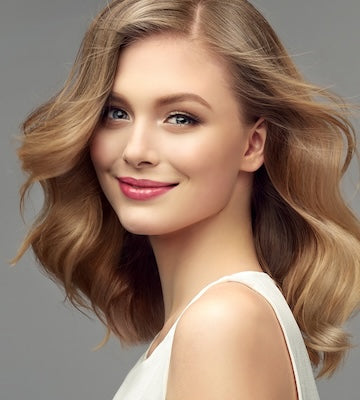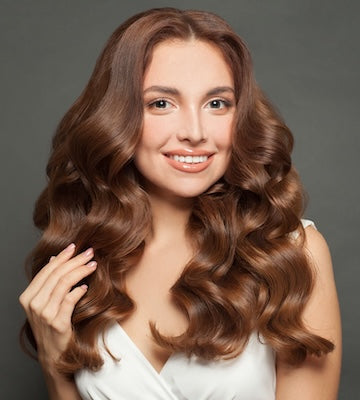Vitamins are a powerhouse for the human body - and your hair is no exception. Our hair is a great reflection of our overall health. When our body lacks essential nutrients, it’s no surprise our hair suffers too. Here are the most important vitamins and minerals to know.
From Vitamin A to B, C, D and E, to Magnesium, Copper, Folate and Calcium (the list goes on!), our bodies rely on a vast array of vitamins and minerals to keep everything running smoothly. These nutrients work behind the scenes, supporting everything from cell regeneration to circulation.
But what vitamins are best for hair health?
In this article, we’ll focus on eight key vitamins and minerals contributing to hair health. We’ll also explain what to look out for if you suspect you’re lacking these essential nutrients, as well as tips for healthy growth.
Let’s dive in and explore the science and benefits behind these remarkable nutrients.
Do vitamins really work for hair?
In short, absolutely. Not only do vitamins work, but they’re essential for keeping your hair strong, shiny and full of life. Like the rest of your body, hair follicles need the right nutrients to function properly. This is where vitamins come in. They act as tiny building blocks, supporting cell division (which helps hair grow), protein synthesis (essential for strong, healthy strands), and repairing oxidative damage (which weakens hair over time).
For instance, antioxidants like vitamins C and E help combat oxidative stress. This happens when there’s an imbalance between free radicals (unstable molecules that can damage cells) and antioxidants in your body. Left unchecked, oxidative stress can weaken hair follicles, leading to dull, thinning hair. Meanwhile, vitamins D and A help regulate the hair growth cycle, avoiding excessive shedding or stunted growth.
So yes, the right vitamins are key to maintaining healthy hair. They really do make a difference!
What are the best vitamins for hair health?
Here are eight essential vitamins and minerals that boost hair health. Each of these nutrients plays a unique role in keeping hair strong, vibrant and growing beautifully.
- Biotin
- Vitamin C
- Iron
- Vitamin D
- Vitamin A
- Vitamin E
- Folic Acid
- Magnesium
Here’s how they work.
1. Biotin
Biotin (or vitamin B7), has a reputation as the go-to vitamin for hair health. It’s widely included in many women’s health supplements, and you can also get it from everyday foods like eggs and bananas.
Biotin is involved in keratin production, the protein that makes up your hair, skin and nails. So it’s naturally linked to promoting strong hair. And it really does work wonders. In a systematic review of scientific studies using biotin for hair and nail health, all cases (18 studies in total) showed clinical improvement after receiving biotin.
However it’s important to note that true biotin deficiency is relatively rare. If you’re eating a healthy, balanced diet, you’re probably getting enough biotin. But if you're struggling with hair health, a supplement might be worth considering.
2. Vitamin C
Vitamin C is one of the best-known vitamins, and for good reason. It’s renowned for its antioxidant properties, protecting your cells from damage caused by free radicals. But did you know that vitamin C is also a champion for your hair?
Here’s how it works: Vitamin C is essential for iron absorption, another mineral critical for hair growth. Without enough vitamin C, even if you’re consuming enough iron, your body might struggle to absorb it effectively.
Vitamin C also plays a vital role in collagen synthesis. Collagen is a protein that supports the structure of your hair, skin and nails. By boosting collagen production, vitamin C can help strengthen your hair strands, making them less prone to breakage.
3. Iron
Iron is a crucial mineral for overall health, and its role in hair health is particularly significant. Iron helps transport oxygen throughout your body, and hair follicles need a good oxygen supply to thrive. When iron levels are low, hair follicles may not get enough oxygen. This can lead to weak and thinning hair.
Can low iron lead to hair loss?
Yes, a lack of iron can lead to hair loss. In fact, low iron is one of the leading causes of a condition known as “telogen effluvium” - a type of hair loss that occurs when the growth cycle is disrupted. Women, especially during periods of menstruation, pregnancy or postpartum, are particularly susceptible to iron deficiency.
Getting enough iron through supplements or your diet (think lean meats, spinach and legumes) can help keep your hair in its full, vibrant phase.
4. Vitamin D
You may already know that vitamin D is essential for bone health. But its importance doesn’t stop there. Vitamin D is also key for maintaining healthy hair. It plays a significant role in the hair follicle cycle and stimulating new growth phases.
In fact, there’s growing evidence that vitamin D deficiency is linked to various types of hair loss. For those living in areas with less sunlight during the winter months (or for anyone who spends a lot of time indoors), ensuring adequate vitamin D intake is crucial.
What does vitamin D hair loss look like?
When you’re low in vitamin D, you might notice thinning hair or patchy areas where hair is missing. If you suspect a lack of vitamin D, a simple blood test is enough to confirm. With proper supplementation and a bit of time, your hair can recover as vitamin D levels return to normal.
5. Vitamin A
Vitamin A is another important nutrient when it comes to hair health. It’s vital for cell growth, which includes the cells in your hair follicles. Vitamin A also helps produce sebum, the oily substance that moisturises the scalp and keeps hair healthy.
However, it’s a bit of a balancing act. Too much vitamin A is linked to hair loss. The key is moderation - ensuring you get enough to support hair health without going overboard. You can find vitamin A in foods like sweet potatoes, carrots and dark leafy greens.
6. Vitamin E
Vitamin E is celebrated for its antioxidant properties. Like vitamin C, vitamin E protects your skin and hair follicles from oxidative damage caused by “free radicals”. This supports robust hair growth.
Additionally, vitamin E improves blood circulation in the scalp. Better circulation means more nutrients and oxygen are delivered to your hair follicles, further promoting growth and overall hair quality. Whether through a balanced diet (including plenty of nuts, seeds and leafy greens) or supplements, vitamin E is an important but unsung hair care hero.
7. Folic Acid
Folic acid (or vitamin B9), is vital for healthy cell growth (that’s why it’s recommended during early pregnancy!). Because hair cells are some of the fastest-growing cells in our body, they require a steady supply of folic acid to support this rapid cell division.
Folic acid is also vital for overall cell regeneration and repair, making it a key player in maintaining not just hair health, but overall vitality. Foods rich in folic acid include leafy greens, citrus fruits, beans and fortified cereals.
8. Magnesium
Magnesium is a widely used women's health supplement, but its role in hair health is less well-known.
This mineral plays a key role in protein synthesis - a process crucial for hair growth. Magnesium deficiency can lead to various health issues, including muscle cramps and fatigue, which contribute to hair loss if your body is under constant stress.
Incorporating magnesium-rich foods like nuts, seeds, whole grains and leafy greens into your diet can maintain optimal levels and support overall hair health.
What vitamin is best for your hair?
After exploring these essential vitamins and minerals, you might be wondering: is there one that’s best for your hair? While each nutrient has unique benefits (and really, they're all needed), many experts would argue that vitamin D stands out.
Why? For starters, vitamin D plays a multifaceted role in hair health. It’s intricately involved in the hair follicle cycle, helping kick-start new growth and maintain healthy hair density. Low levels of vitamin D are linked to various forms of hair loss, which makes it a critical nutrient for anyone experiencing thinning or patchy hair. When you combine its role in supporting immune function and overall cell health, vitamin D is a cornerstone for vibrant, healthy hair.
Remember, though, no single vitamin works miracles on its own. A holistic approach including a balanced and varied diet, gentle hair care (avoiding too much heat-styling and chemical treatments) and reducing stress is key to beautiful hair.
What vitamin am I lacking if my hair is falling out?
This is a tricky question because hair loss can be influenced by deficiencies in any of the vitamins we’ve discussed. Factors like stress, genetics, hormones and overall health can also play a part. However, here are some tell-tale signs that might help you narrow it down:
-
Biotin deficiency: You might notice brittle hair that breaks easily, along with dry skin and nail issues. However, true biotin deficiency is rare with a balanced diet
-
Vitamin C deficiency: Look out for weak, thinning hair and a tendency for breakage. Since vitamin C aids iron absorption, a deficiency might compound the effects of low iron
-
Iron deficiency: Fatigue, pale skin and noticeable hair thinning (often around the crown) could all be signs of low iron levels
-
Vitamin D deficiency: Aside from fatigue and bone discomfort, you might see thinning hair or patchy hair loss. If you suspect vitamin D deficiency, a blood test can give answers
-
Vitamin A excess or deficiency: While a deficiency might result in dry, brittle hair, too much vitamin A can cause hair loss. So balance is key
-
Vitamin E deficiency: A lack of vitamin E might manifest as a dry scalp and dull, lifeless hair. This is largely due to the toll oxidative stress takes on hair follicles
-
Folic acid deficiency: Since folic acid is vital for cell division, you might experience slower hair growth or shedding
-
Magnesium deficiency: General fatigue, muscle cramps and even stress-related hair loss might suggest low magnesium levels
Because symptoms can overlap, it’s essential to approach hair loss holistically. A visit to your GP or a registered nutritionist can help you pinpoint any deficiencies through blood tests and evaluation of your diet and lifestyle.
Can hair grow back after vitamin deficiency?
This is such a positive note to end on - and the good news is, yes! Hair can absolutely grow back and regain its natural volume after vitamin deficiency. By restoring your nutrient levels through a well-balanced diet, supplementation or lifestyle changes, you’re giving your hair everything it needs to grow back stronger.
That said, hair growth is a gradual process. It takes time and patience. But once your body has the nutrients it needs, your follicles can return to their normal, healthy cycles. How long this takes depends on the severity of the deficiency and other underlying factors. Some may notice improvements within a few months, while for others, it might take longer. But consistency is key. Nourish your hair from within, and over time, you’ll see the results.
In the meantime, for instant volume and fullness, Phoenix Crown hair extensions are the perfect solution. Our ultra-light flexi-wefts blend seamlessly for a natural look, adding volume exactly where you need it - whether at the crown, temples or all over.
Explore our full range of luxurious Virgin human hair extensions and enjoy fuller, thicker hair while nurturing healthy regrowth.










